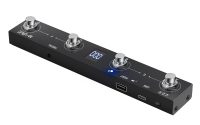Practice Regularly and Set Goals for Improvement
As an Amazon Associate, I earn from qualifying purchases. That means I earn commissions from my sponsored links or I make money when readers (you) purchase items through my links. Your purchase allows me to continue working as a stay-at-home dad who moonlights as a farmer and a musician. Needless to say, this post contains affiliate links.
Consistent practice is crucial for any band wanting to seriously develop their skills and tightness. Set aside dedicated times weekly for full-band rehearsals, and treat them as mandatory obligations.
The foundation of any successful band is to practice regularly in a disciplined manner. Scheduling consistent rehearsals is the key to success of any band regardless of experience level. Practice sessions should be viewed as essential commitments, like doing a job or going to school.
This mindset fosters a professional attitude and ensures all members prioritize their time together.
During practices, focus not just on running through songs but isolating and working on areas needing improvement like timing, harmonies, transitions, etc.
Instead of merely playing through your setlist, hone in on specific aspects that need work. Timing issues, harmony mismatches, and rough transitions can all disrupt the flow of a performance.

Isolate these segments and practice them repeatedly until they are smooth. This targeted approach accelerates improvement.
Set specific measurable goals like tighter rhythm section lockup, smoother key changes, eliminating flubs, etc.
Having clear, measurable objectives keeps the band on track. Goals could include achieving a tighter rhythm section, smoother transitions between key changes, or reducing errors in live performances. These targets provide focus and a sense of accomplishment as each is met.
Keep a practice log to track progress over time. Consider recording practices to critically analyze afterward.
A practice log is an invaluable tool. Document each session, noting what was worked on, what progress was made, and what still needs improvement. Recording rehearsals allows the band to listen back and critically assess their performance.
This feedback loop is essential for continuous improvement.
Make rehearsals productive by having an agenda, taking breaks, and staying focused.
Structure is key to productive rehearsals. An agenda outlining the day’s goals ensures that time is used efficiently. Schedule short breaks to maintain energy levels and prevent burnout. Focus on the tasks at hand, avoiding distractions that can derail the session.
The more you purposefully practice together, the more cohesive you’ll become. Cohesion comes from shared effort and mutual understanding. Purposeful practice builds this bond, as each member learns to anticipate and complement the others’ playing styles. Over time, this synergy creates a seamless, unified sound.




